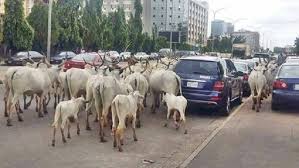Abdulkarim Suleiman Dambazau, Kano
” If you look at history carefully, it’s not the cows crossing towns but the towns crossing the cows’ grazing route.”
Introduction:
For generations, cattle rearing has been a cornerstone of Northern Nigeria’s economy and culture. However, the increasing clashes between farmers and herders have brought untold suffering, economic losses, and environmental degradation. A critical but often overlooked fact is that 80% of the farmlands currently in crisis with cattle owners were originally Gadun Sarki —designated grazing reserves established over 50 years ago to sustain pastoralism Sadly, unchecked urban expansion, illegal encroachment by farmers, and government neglect have turned these vital reserves into conflict zones.
The Disappearing Grazing Reserves: A Historical Betrayal
The Northern regional government, recognizing the importance of pastoralism, demarcated vast stretches of land as Gadun Sarki (grazing reserves) to ensure harmony between farmers and herders. These lands were meant to provide pasture, prevent conflicts, and sustain livestock production. However, over the decades, weak enforcement, corruption, and poor land management led to:
– Illegal land grabs by farmers and property developers
– Unplanned expansion of towns into grazing corridors
– Government’s failure to secure and modernize these reserves
Related:
Today, herders are left with no choice but to move their cattle into farmlands, leading to violent confrontations. As the saying goes, “It’s not the cows crossing the towns, but the towns crossing the cows’ path.”
The Consequences of Neglect
1. Escalating Farmer-Herder Conflicts – The destruction of grazing reserves has forced pastoralists into farmlands, sparking deadly clashes.
2. Declining Livestock Production – Shrinking grazing lands mean weaker cattle, lower milk yields, and reduced income for millions.
3. Environmental Degradation – Deforestation, soil erosion, and loss of biodiversity result from unregulated farming and urban sprawl.
4. Economic Losses – Nigeria spends billions on food imports, yet we are destroying the very system that could make us self-sufficient in meat and dairy.
A Call to Action: What Must Be Done:
1. Immediate Recovery of Grazing Reserves – The Federal Ministry of Livestock, in collaboration with state governments, must reclaim all encroached Gadun Sarki lands and restore them for pastoral use.
2. Expansion of Grazing Reserves – More lands should be acquired and demarcated to accommodate the growing cattle population.
3. Compulsory Ranching & Settlement – Herders must be encouraged (and, if necessary, compelled) to adopt modern ranching systems, ending the destructive practice of open grazing.
4. Town Planning Reforms – Urban developers must be held accountable for encroaching on grazing reserves. Future town plans should integrate livestock corridors.
5. Investment in Pastoral Infrastructure – Government and private investors should build water points, veterinary services, and fodder farms in grazing reserves.
Read Also:
FULDAN Kano Chapter Elects New Executives, Commits to Community Development
A Message to Northern Elites & Policy Makers
The Northern elite, many of whom grew up knowing the importance of Gandun Sarki, must now act decisively. The Livestock Ministry must move beyond rhetoric and enforce existing laws on grazing reserves. If we continue to allow unchecked farming and urban expansion into these reserves, we are not only destroying an ancient way of life but also fueling a crisis that will consume future generations.
The time to act is now. Let us reclaim our grazing reserves, modernize livestock farming, and restore peace between farmers and herders. The survival of our ecosystem, economy, and social harmony depends on it.
Abdulkarim Suleiman Dambazau, a concerned advocate for sustainable pastoralism writes from Kano.























 You can install this WP plugin on your website from the WordPress official website:
You can install this WP plugin on your website from the WordPress official website: 